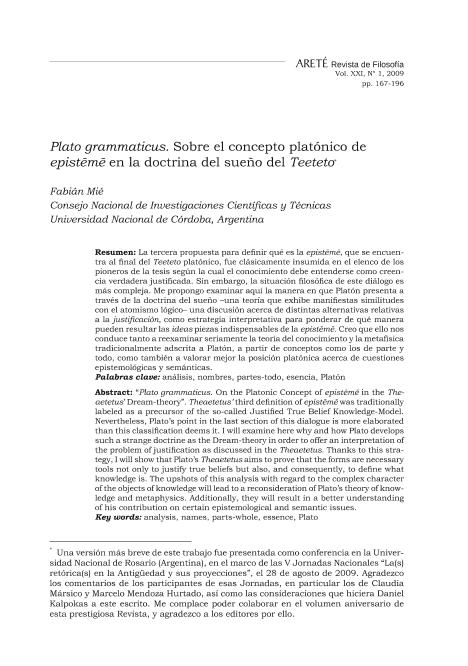Mostrar el registro sencillo del ítem
dc.contributor.author
Mie, Fabian Gustavo

dc.date.available
2020-02-23T22:24:11Z
dc.date.issued
2009-12
dc.identifier.citation
Mie, Fabian Gustavo; Plato grammaticus. Sobre el concepto platónico de epistéme en la doctrina del sueño del Teeteto; Pontificia Universidad Católica de Perú; Areté; 21; 1; 12-2009; 167-195
dc.identifier.issn
1016-913X
dc.identifier.uri
http://hdl.handle.net/11336/98387
dc.description.abstract
La tercera propuesta para definir qué es la epistēmē, que se encuentra al final del Teeteto platónico, fue clásicamente insumida en el elenco de los pioneros de la tesis según la cual el conocimiento debe entenderse como creencia verdadera justificada. Sin embargo, la situación filosófica de este diálogo es más compleja. Me propongo examinar aquí la manera en que Platón presenta a través de la doctrina del sueño –una teoría que exhibe manifiestas similitudes con el atomismo lógico– una discusión acerca de distintas alternativas relativas a la justificación, como estrategia interpretativa para ponderar de qué manera pueden resultar las ideas piezas indispensables de la epistēmē. Creo que ello nos conduce tanto a reexaminar seriamente la teoría del conocimiento y la metafísica tradicionalmente adscrita a Platón, a partir de conceptos como los de parte y todo, como también a valorar mejor la posición platónica acerca de cuestiones epistemológicas y semánticas.
dc.description.abstract
Theaetetus third definition of epistēmē was traditionally labeled as a precursor of the so-called Justified True Belief Knowledge-Model. Nevertheless, Plato s point in the last section of this dialogue is more elaborated than this classification deems it. I will examine here why and how Plato develops such a strange doctrine as the Dream-theory in order to offer an interpretation of the problem of justification as discussed in the Theaetetus. Thanks to this strategy, I will show that Plato s Theaetetus aims to prove that the forms are necessary tools not only to justify true beliefs but also, and consequently, to define what knowledge is. The upshots of this analysis with regard to the complex character of the objects of knowledge will lead to a reconsideration of Plato s theory of knowledge and metaphysics. Additionally, they will result in a better understanding of his contribution on certain epistemological and semantic issues.
dc.format
application/pdf
dc.language.iso
spa
dc.publisher
Pontificia Universidad Católica de Perú
dc.rights
info:eu-repo/semantics/openAccess
dc.rights.uri
https://creativecommons.org/licenses/by-nc-sa/2.5/ar/
dc.subject
análisis
dc.subject
nombres
dc.subject
partes-todo
dc.subject
esencia
dc.subject
Platón
dc.subject.classification
Filosofía, Historia y Filosofía de la Ciencia y la Tecnología

dc.subject.classification
Filosofía, Ética y Religión

dc.subject.classification
HUMANIDADES

dc.title
Plato grammaticus. Sobre el concepto platónico de epistéme en la doctrina del sueño del Teeteto
dc.title
Plato grammaticus. On the Platonic Concept of epistēmē in the Theaetetus Dream-theory
dc.type
info:eu-repo/semantics/article
dc.type
info:ar-repo/semantics/artículo
dc.type
info:eu-repo/semantics/publishedVersion
dc.date.updated
2020-02-13T18:56:47Z
dc.journal.volume
21
dc.journal.number
1
dc.journal.pagination
167-195
dc.journal.pais
Perú

dc.journal.ciudad
Lima
dc.description.fil
Fil: Mie, Fabian Gustavo. Consejo Nacional de Investigaciones Científicas y Técnicas. Centro Científico Tecnológico Conicet - Santa Fe; Argentina. Universidad Nacional de Córdoba; Argentina
dc.journal.title
Areté
dc.relation.alternativeid
info:eu-repo/semantics/altIdentifier/url/http://www.scielo.org.pe/scielo.php?script=sci_arttext&pid=S1016-913X2009000100009
dc.relation.alternativeid
info:eu-repo/semantics/altIdentifier/url/http://repositorio.pucp.edu.pe/index/handle/123456789/112916
Archivos asociados
